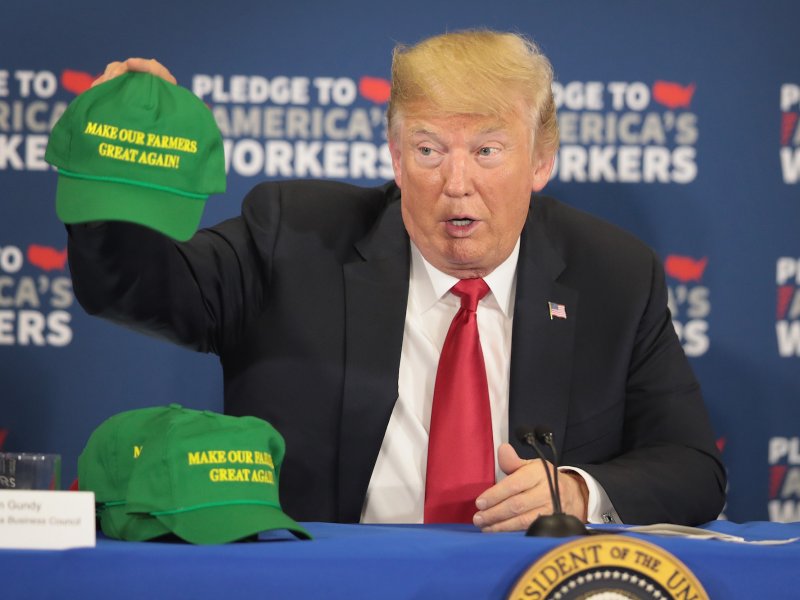 © Scott Olson/Getty Images, US President Donald Trump participates in a round-table discussion with business leaders at Northeast Iowa Community College on July 26, 2018 in Peosta, Iowa.
© Scott Olson/Getty Images, US President Donald Trump participates in a round-table discussion with business leaders at Northeast Iowa Community College on July 26, 2018 in Peosta, Iowa.- At least 84 farms in the upper Midwest filed for Chapter 12 bankruptcy in the year ending in June, according to a new Minneapolis Federal Reserve analysis.
- That’s more than twice the level seen over the same period four years ago.
- Tariffs have added pressure to already low margins for farmers.
As President Donald Trump maintains protectionist policies with global trading partners, an increasing number of farms in the Midwest are struggling to stay afloat.
At least 84 farm operations in Minnesota, Montana, North and South Dakota, and parts of northwestern Wisconsin filed for bankruptcy in the 12 months ending in June, according to a new analysis from the Minneapolis Federal Reserve, more than twice the level seen over the same period in 2014.
The strain of low commodity prices on farmers and ranchers has been compounded by tariffs, Ron Wirtz, regional director for the central bank, said in the report. Trump has placed tariffs on more than $300 billion worth of imports to date and threatened his policies could further escalate on multiple fronts.
As countries retaliate against the Trump administration with duties on American goods, key commodity prices have fallen sharply. Soybeans, for example, have shed nearly a fifth of their value since April. The New York Times reported this month that exports of the legume to China fell 94% through mid-October from a year earlier.
Farming margins have been “squeezed for some time, so the tariffs are certainly just more problems on top of a list of continuing problems,” said Kevin McNew, chief economist at Farmers Business Network.
States where bankruptcies are on the rise are especially vulnerable to trade tensions with China, McNew said, which placed retaliatory duties on American soybeans earlier this year. While growers in other parts of the country have other foreign markets to turn to, the upper Midwest is highly dependent on soybean trade with China.
And in Wisconsin, where about 60% of all farm bankruptcies were filed, there are more small-sized farms that tend to be particularly vulnerable to price changes.
Falling prices have also exerted pressure on farming finances throughout the rest of the Midwest, with more than half of respondents in a Kansas City Federal Reserve survey reporting lower farm income than a year ago.
Trump is expected to meet with Chinese President Xi Jinping at the G20 summit in Argentina starting Friday. But the president and his administration, asserting tariffs will pressure other countries to change trade practices seen as unfair, have cast doubt on negotiations in recent days.
Lack of optimism for a resolution has weighed on farmers’ outlooks for the rest of the year and beyond. In Missouri and Nebraska, more than 70% of survey respondents anticipated incomes would continue to fall throughout the next three months.
“I would say we’re on the start of something and not the end of something,” McNew said. “There’s just nothing on the horizon that really suggests things are going to get better.”
Fusion Media or anyone involved with Fusion Media will not accept any liability for loss or damage as a result of reliance on the information including data, quotes, charts and buy/sell signals contained within this website. Please be fully informed regarding the risks and costs associated with trading the financial markets, it is one of the riskiest investment forms possible.
Source: Investing.com





























